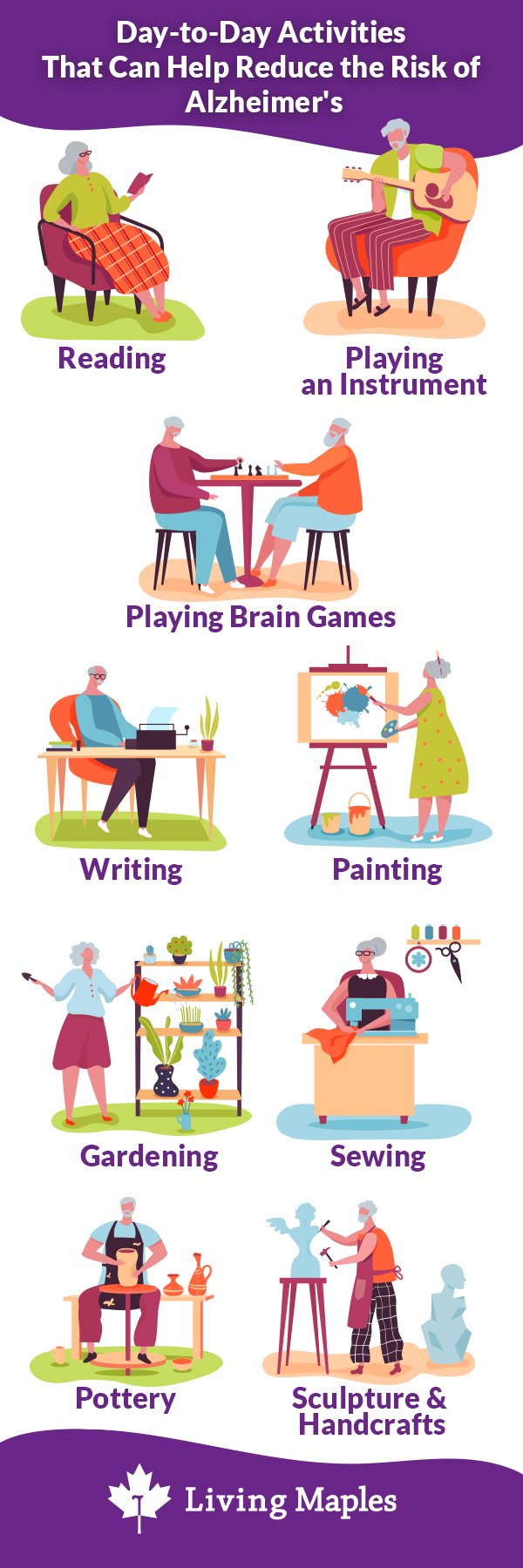
Top 5 In-Home Activities Tied to Lower Dementia Risk
The number of people living with Dementia worldwide exceeds 55 million, with nearly 10 million new cases emerging every year.
It has been a frustrating journey to find effective treatments for Alzheimer’s disease and other memory disorders, not to mention a cure. A total of 33 investigational drugs have reached the final stages of experimental testing, and all have failed. In fact, doctors still treat Alzheimer’s symptoms with the same medications they’ve been using since 2003.
However, Dementia prevention research continues to grow as treatment research struggles. Various studies from all over the world indicate ways to reduce the risk of Dementia as we age, and drugs are not the answer. We will therefore discuss the top 5 in-home activities associated with lower Dementia risk below.

Contents
Dementia: What Is It and How Does It Affect You?
The term Dementia refers to various neurodegenerative diseases affecting the brain. Alzheimer’s disease occurs when healthy neurons in the brain die more rapidly than usual.
Based on the World Health Organization (WHO), Alzheimer’s symptoms involve forgetfulness, losing track of time, and not remembering familiar people early on.
Researchers have identified a number of factors that may contribute to the condition, including:
- Smoking
- Obesity
- Alcohol consumption
- Hypertension
- Hearing impairment
- Depression
- Diabetes
The effectiveness of reactive treatments is only moderate, but preventive measures significantly reduce the risk of developing the disease. Next, we will discuss what preventive measures you can take and the science behind it all.
Taking Preventative Measures to Lower Dementia Risk’
According to the latest studies, participation in frequent exercise, household chores, and daily social contact reduced dementia risk.
The researchers further found that physical activity reduced the risk of Dementia among all participants- regardless of family history or genetic risk.
Compared to those least engaged in these activities, those who exercise frequently, do household chores and receive daily visits from their friends and family were at a 35%, 21%, and 15% lower risk of Dementia, respectively.
Getting started might be challenging if you’re not used to being physically active. Therefore, finding an activity that suits you is essential. Starting small and gradually increasing activity may be helpful.
Underlying Mechanisms: What We Know
Although the mechanism linking physical activity and reduced dementia risk remains unknown, several possible explanations have emerged. Exercise has antioxidant effects, which may delay oxidative damage in the brain, and improving cerebral blood flow might reduce age-related cognitive decline.
Furthermore, exercise may influence other modifiable cognitive factors, such as:
- obesity
- hypertension
- insulin resistance
- depression
- cardiovascular fitness
What Activities Can Lower Dementia Risk?
Following up, we will review physical activities you can do at home that according to related studies can reduce the risk of Dementia.
Exercising
In recent months, three major long-term studies investigated the types, intensities, and durations of physical activity associated with dementia prevention. The findings confirm that regular physical activity is associated with a lower risk of Dementia.
These are the three types of exercise that can reduce Dementia Risk:
- Aerobic exercise
- Strength, weight or resistance training
- Flexibility and balance training
Doing Household Chores
Keeping your home clean, organized, and disease-free is possible through household chores. Researchers report that this not only reduces stress but also promotes better sleep and rest.
A study on more than 500,000 adults found those who performed household chores had a 21 percent lower risk of developing Dementia. Among the most protective activities, chores rank second behind regular exercises, such as brisk walks or bike rides, which reduced dementia cases by 35 percent.
Gardening
As we get older, gardening becomes increasingly important and a constant delightful part of our lives. We can relax and recover in gardens while also receiving multi-sensory stimulation from the environment around us. Physical barriers may prevent seniors from accessing other pastimes or hobbies in their golden age, but gardening remains an enjoyable activity.
But did you know gardening could also slash your risk of Dementia by 21%? Approximately half a million people were asked about their physical activity levels and followed up for an average of almost 11 years to evaluate the effects of gardening on reducing Dementia.
In addition to creating a shared experience, gardening encourages physical activity, stimulates the senses, and enhances memory.
Dancing
Building your brain’s neural complex is similar to exercising; to become fitter, you need to train regularly. As a result, the more you dance, the greater your cognitive reserve will be. Believe it or not, regular dancing reduces the risk of Dementia by 76%, significantly more than reading.
However, there are differences between the cognitive benefits of different forms of dancing. You might improve your performance by memorizing sequences, but you won’t create new neural pathways this way. Freestyle dancing, such as foxtrot, waltz and swing, requires constant split-second decision-making, which is the key to maintaining intelligence. As a result, your brain needs to regularly rewire its neural pathways, improving your cognitive reserve and increasing the complexity of neuronal connections.

Cooking
Seniors’ brains can be stimulated by the actions associated with cooking. In order to cook, one must focus, which keeps the mind active. In addition to providing ease, focusing on a task also exercises the brain.
A study with 716 volunteers over 80 found that washing, cooking, and cleaning can help reduce the risk of Dementia.
The study found that only 71 seniors developed Alzheimer’s disease after three years. The least active individuals had twice the chance of developing the disease as the most active individuals. In the long run, even light activities such as cooking can benefit seniors who cannot participate in formal exercises.
Final Words
According to estimates, over 150 million people worldwide will have Dementia by 2050. As there is no cure for Alzheimer’s right now, protective habits are becoming essential to preserve brain function. Remember, In-Home Activities, along with exercise, have a huge role in Dementia prevention, but eating a healthy, balanced diet and socializing will also reduce the risk of Dementia.

These activities are enjoyable and promote cognitive and physical health. It’s never too early or late to start incorporating these activities into our daily routines, and this article provides a great starting point.
It’s incredible to think that simple, everyday activities can positively impact our brain health and reduce the risk of dementia. As someone who enjoys crafts and cooking, I’m excited to see that these activities are on this list. It’s a reminder that caring for our physical and mental health can be enjoyable and fulfilling.